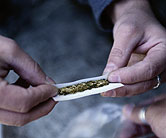Even a Little Pot Use Ups College Dropout Risk
Second study found similar connection with other drugs.
College students who use marijuana and other illegal substances, even occasionally, are more likely to leave school than students who don't dabble in drugs, new research finds.

There's a strong link between marijuana use and "discontinuous enrollment," said study author Dr. Amelia Arria, director of the Center on Young Adult Health and Development at the University of Maryland School of Public Health. The same goes for other illicit drugs, she added.
In a recent issue of the Journal of Studies on Alcohol and Drugs, Arria and her colleagues reported that students with high levels of marijuana use (more than 17 days a month) were twice as likely as those with minimal use (less than a day a month) to have an enrollment gap while in college. But even students who used pot less often, in the range of three to 12 days a month, were more likely to experience enrollment gaps.
Arria said, "We wanted to look at whether or not drug use interferes with goals students had set for themselves. Our results show that marijuana use is not a benign thing."
For their research, the authors used data from the College Life Study, ongoing research on health-related behaviors among college students. They tracked 1,133 participants (47 percent male) over four years. All of the students began their freshman year between the ages of 17 and 19, and they all attended the same university located in the mid-Atlantic region of the United States.
During each school year, they participated in questionnaires and interviews, even if they had decided not to return to classes at the university (a financial incentive was offered). Their enrollment and graduation data were obtained from university records that the students consented to share.
"Continuous enrollment" was defined as being enrolled at the university for at least one credit during each fall and spring semester for the first four years of the study, Arria said. By the study's end, 71 percent of the students had remained continuously enrolled over four years, and 29 percent had not.
Reasons that students left college varied. While some transferred to another university, others exited college life altogether, so the authors opted to use the term "discontinued enrollment" instead "dropout."
Aria said it's key to point out that their results were independent of other factors such as demographics, high school GPA, fraternity or sorority enrollment, personality type, risk-taking behaviors, and a student's use of tobacco and alcohol.
"Marijuana use was still a predictor of discontinuous enrollment," Arria said.
A second study, published in the journal Psychiatric Services and funded by the U.S. National Institute on Drug Abuse, looked at drug use and mental health problems and the risk of leaving college prematurely. Arria and her colleagues report that students who experience symptoms of depression and seek treatment for depression during college might be at risk for an enrollment gap, too, especially if they use pot or other illicit drugs.
However, students whose depression was identified and treated before heading to college were not at risk for enrollment problems once at the university level.
Dr. Marc Galanter, director of the division of alcoholism and drug abuse at NYU Langone Medical Center and a professor at the NYU School of Medicine, said the studies are interesting, especially when reviewed together.
"When they say there's a need for early intervention for illicit drug users, there may be other issues that cast the die for drug use, namely depression," Galanter said. "The question is, do drugs cause the problem or are they a consequence of some other problem? Could it be depression that leads people to use drugs secondarily? It's not clear what's causal."
Study author Arria said that although marijuana tends to be viewed as a more benign drug, that is a fallacy. "The perceived risk of marijuana is declining because people think it's more benign than it is, and its use is going up among college students. But we've known for a long time that marijuana affects cognition and memory."
Nonmedical use of prescription drugs is also a concern among college students.
Galanter said, "The real serious drug problem is the painkillers -- Percocet, Vicodin, OxyContin. There are a notable number of young people getting seriously addicted. It's a noticeable statistic. Some of these drugs come from the family medicine cabinet but there are also people who get illicit prescriptions and then sell the drugs as dealers."
Arria said that school administrators and parents can help by communicating with kids early in adolescence about the risks of drugs, and intervening when a child needs help and support. Armed with that support, students are more likely to stay in college once they get there.
Source: HealthDay News
- 331 reads
Human Rights
Ringing FOWPAL’s Peace Bell for the World:Nobel Peace Prize Laureates’ Visions and Actions

Protecting the World’s Cultural Diversity for a Sustainable Future

The Peace Bell Resonates at the 27th Eurasian Economic Summit

Declaration of World Day of the Power of Hope Endorsed by People in 158 Nations

Puppet Show I International Friendship Day 2020

